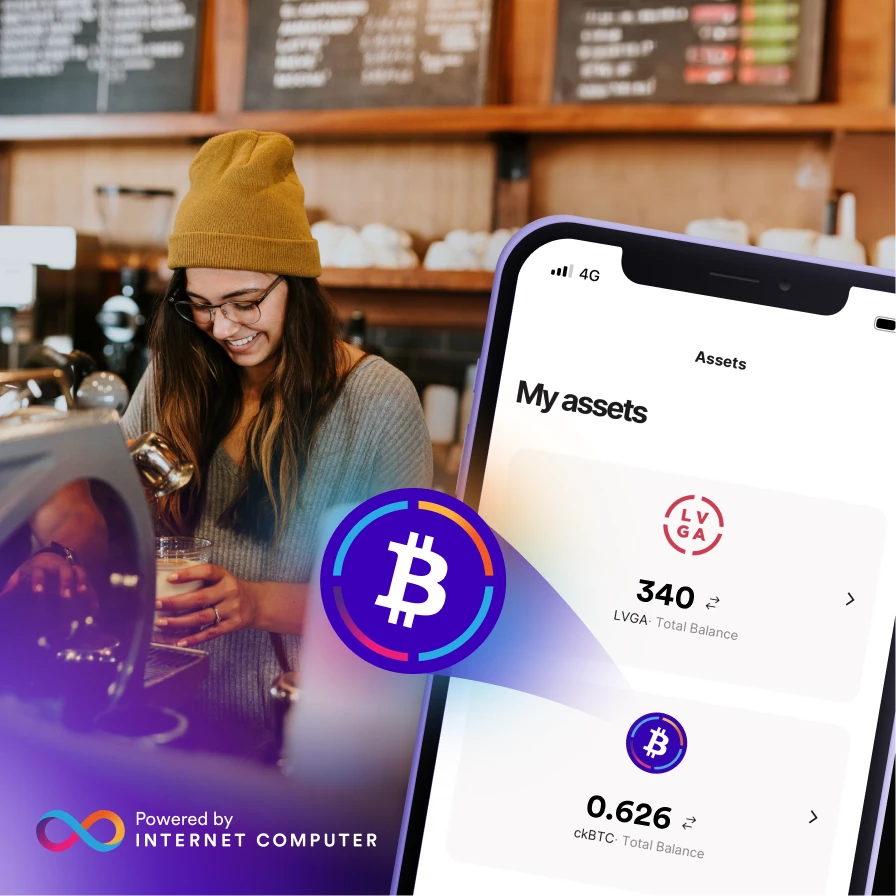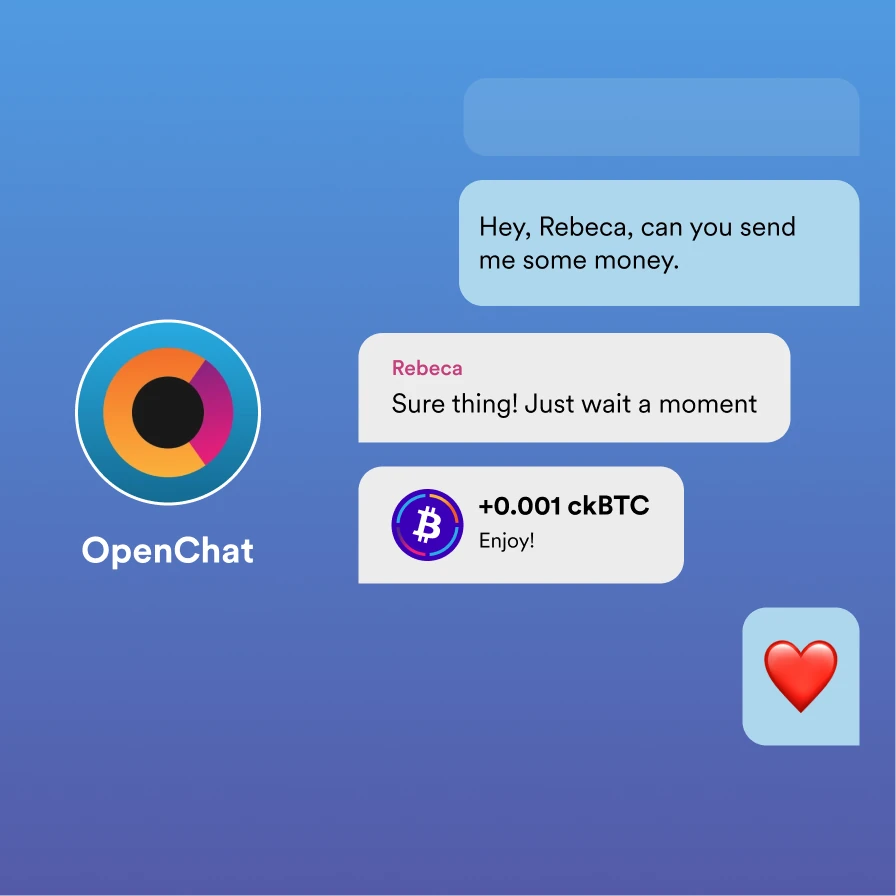ckBTC is bitcoin
on Web3
ckBTC — a multichain bitcoin twin, created by chain-key cryptography and Internet Computer smart contracts that directly hold raw bitcoin. Send and receive ckBTC with 1-2 second finality and negligible fees. Only possible because ICP smart contracts can call into the Bitcoin network.

Hold, send and receive native bitcoin as if the Internet Computer and the Bitcoin network were one blockchain. No off-chain intermediaries.

ckBTC comes to Lugano
As part of a multichain, multi-wallet upgrade, ckBTC has been integrated into the MyLugano crypto payment app developed by NOKU. This is a major step towards the Internet Computer infrastructure integrating with the city of Lugano to eventually enable a plethora of municipal services using bitcoin.
Read the press releaseSend bitcoin at the speed of chat
OpenChat is the first chat network built 100% on a blockchain. Each OpenChat account is assigned to its own canister smart contract capable of sending, receiving and storing messages. It also acts as a wallet, which enables users to hold, send and receive ckBTC. Invite friends to OpenChat to receive and send around satoshis with ease, and at the speed of a chat message.
OpenChat is controlled an SNS DAO, making owners of its CHAT governance token the custodians of the OpenChat networks future.
Join the OpenChat network

Tip creators with bitcoin
DSCVR is an end-to-end decentralized Web3 social media platform on which communities form into groups called Portals. Create NFT gated Portals, airdrop fungible and non-fungible tokens to members and tip content creators for posts in a growing number of tokens and ckBTC. Social media tipping with bitcoin realizes a key part of Satoshi's original vision.
Check out DSCVRFast TXs with negligible fees
Enables small and casual transactions with bitcoin.
- Fixed transaction fee: 10 satoshis
- Finality: 1-2 sec
- Full balance always available. No channel liquidity issues
Programable bitcoin
Build applications that address real world needs.
- Canister smart contracts can hold and send ckBTC
- Build web applications with BTC support. Users only need a browser
Transactions across multiple chains
Send and receive ckBTC value to and from addresses on either network
- No centralized off-chain intermediaries
- Chain-key integrations with other networks like Ethereum
Wallets & DEXs supporting ckBTC
What you need to know about ckBTC

Why it's more secure than traditional bridged tokens
The key innovations behind ckBTC are the native Bitcoin integration and chain-key ECDSA signing — advanced threshold cryptography integrated with ICP. In short, chain-key ECDSA is a set of cryptographic protocols that allow Internet Computer nodes to cooperatively create ECDSA signatures, which can be used to sign bitcoin transactions, using a highly fault-tolerant, decentralized network that is resilient to attacks by malicious nodes. The secret key is never stored in one place, instead it is broken down into key shares held by ICP nodes that are re-shared periodically. When requested, nodes use their key shares to collectively sign BTC transactions without recreating the original secret key.
This enables a pair of canister smart contracts to create ckBTC, a multichain bitcoin twin that can be controlled by smart contracts and sent with near instant finality for negligible fees — all without the need for centralized custodians.
Better than a wrapped token
More than a token, while ckBTC implements the ICRC-1 fungible token standard, the pair of canister smart contracts also allow bitcoin to be freely sent between addresses either on the Bitcoin network or the Internet Computer, making it the first true multichain asset.
ckBTC security auditHow ckBTC's security was assessed
Several security assessments are taken on critical components of the Internet Computer such as ckBTC to ensure robust security. These include TLA+ models to formally verify some guarantees, several internal and external security assessments. In 2023, both Bitcoin integration and ckBTC have undergone an external security audit conducted by Trail of Bits with no severe issues found.
ckBTC security auditHow it differs from Lightning
The Lightning Network is the most well known Layer-2 for Bitcoin. Like ckBTC, it allows fast and cheap transfers of BTC value off the Bitcoin blockchain.
Unlike Lightning, ckBTC does not require peer-to-peer payment channels to be established and funded. This means that your full ckBTC balance can always be transferred — no network liquidity limitations.
Canister smart contracts can programmatically hold and transfer ckBTC, making it possible to develop fully onchain Layer-2 applications for Bitcoin, which is not possible using the Lightning Network.
Another key difference is that ckBTC transaction fees are fixed, and not dependent on the transaction amount, variable intermediate forwarding, or unexpected channel funding fees.
In the future, ckBTC will be available on other networks like Ethereum – also directly, and without bridges, thanks to chain-key cryptography integrations.
How Native Bitcoin Integration WorksBlog: Chain-Key Bitcoin: A Decentralized Bitcoin Twin






